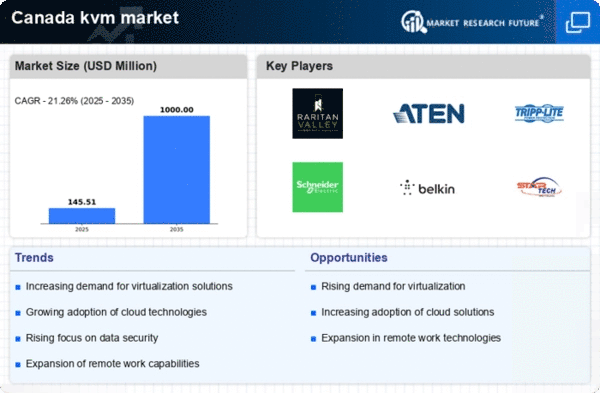Emergence of Edge Computing
The emergence of edge computing is poised to impact the kvm market in Canada significantly. As businesses seek to process data closer to the source, the demand for virtualization solutions that can support edge computing architectures is likely to increase. KVM technologies can facilitate the management of distributed computing resources, enabling organizations to deploy applications at the edge effectively. This trend is particularly relevant in sectors such as manufacturing and healthcare, where real-time data processing is critical. The kvm market may see a shift in focus as companies invest in solutions that align with their edge computing strategies, potentially leading to new opportunities for growth.
Investment in Cybersecurity Measures
Investment in cybersecurity measures is becoming increasingly critical for organizations in Canada, thereby influencing the kvm market. As cyber threats evolve, businesses are prioritizing the protection of their IT infrastructure, which includes the implementation of virtualization technologies that enhance security. KVM solutions offer features such as isolation and secure access controls, making them attractive for organizations looking to bolster their cybersecurity posture. Recent reports indicate that Canadian companies are expected to increase their cybersecurity budgets by over 20% in the coming years. This heightened focus on security is likely to drive demand for KVM solutions that can integrate with existing security frameworks, thereby shaping the future of the kvm market.
Increased Adoption of Cloud Computing
The kvm market in Canada is experiencing a notable surge due to the increased adoption of cloud computing solutions. Organizations are increasingly migrating their operations to cloud environments, which necessitates robust virtualization technologies. This shift is driven by the need for scalability, flexibility, and cost efficiency. As businesses seek to optimize their IT infrastructure, the demand for KVM solutions is projected to grow. According to recent data, the cloud computing market in Canada is expected to reach approximately $10 billion by 2026, indicating a strong correlation with the kvm market. This trend suggests that as more companies embrace cloud services, the kvm market will likely expand to meet the evolving needs of these enterprises.
Growing Need for Remote Work Solutions
The kvm market is significantly influenced by the growing need for remote work solutions in Canada. As organizations adapt to flexible work arrangements, the demand for virtualization technologies that facilitate remote access to systems and applications has intensified. KVM solutions enable seamless connectivity and management of virtual machines, which is essential for remote workforce productivity. Recent statistics indicate that over 30% of Canadian employees are now working remotely, a trend that is likely to persist. This shift not only enhances employee satisfaction but also drives the kvm market as companies invest in technologies that support remote operations and ensure business continuity.
Rising Focus on IT Infrastructure Optimization
In Canada, there is a rising focus on IT infrastructure optimization, which is a key driver for the kvm market. Organizations are increasingly recognizing the importance of efficient resource utilization and cost reduction in their IT operations. KVM solutions provide a means to consolidate servers and improve hardware utilization, leading to lower operational costs. As businesses strive to enhance their IT efficiency, the kvm market is expected to benefit from this trend. Data suggests that companies can achieve up to 40% savings in hardware costs by implementing virtualization technologies, thereby reinforcing the relevance of KVM solutions in the current market landscape.















